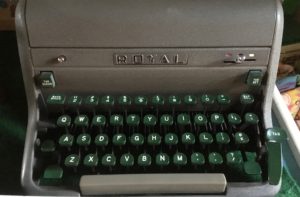 Experts estimate it takes between 10 and 15 minutes for the average person to return to focused concentration every time they are interrupted. Multiply that by two or three times in the hour you set aside for your work, and it is clear how sixty minutes of writing time evaporates. Whether you interrupt yourself or are interrupted by others, you need to have a plan for dealing with it. You may be caring for young children, parents, relatives, friends, and older/younger pets who require your attention, time, and love. Amid these obligations, it can be challenging to carve out time for our writing projects. This blog post will discuss ways to deal with disruptions children, partners, and family members create.
Experts estimate it takes between 10 and 15 minutes for the average person to return to focused concentration every time they are interrupted. Multiply that by two or three times in the hour you set aside for your work, and it is clear how sixty minutes of writing time evaporates. Whether you interrupt yourself or are interrupted by others, you need to have a plan for dealing with it. You may be caring for young children, parents, relatives, friends, and older/younger pets who require your attention, time, and love. Amid these obligations, it can be challenging to carve out time for our writing projects. This blog post will discuss ways to deal with disruptions children, partners, and family members create.
In addition, if you deal with your personal distraction issues, it is essential to find ways to ameliorate them, or you’ll never “find the time” to finish your writing project.
Here are some methods to stop interruptions or lessen their impact of them. suggestions
Things we cannot control: A short note about things beyond your control: infants and children.
When children are young, and you are caring for them, you can’t just leave them in another room and ignore them, especially when they’re infants. When my kids were babies, I wrote while they napped and after their bedtime.
As they grew older, I worked to find ways to entertain them, things that would keep them distracted while I worked. It was slow going and so frustrating working in small bits of time. But all those tiny bits of writing added up to my first novel. When I get overwhelmed and think that I’m never I’m going to finish writing my book or I contemplate giving up, I have an inspirational photo I look at to remind me what’s possible.
In the photo my twins asleep in their little bouncy seats and I am working at my desk. It reminds me that if I wrote my master’s thesis between the time they were born and when they turned one, I can do anything. When I look at that photograph, I’m reminded of the power of small bits of time.
This works when caring for other family and friends as well. Sometimes, you need to care for other folks, and being a caregiver can become all-consuming. It is emotionally and physically exhausting, yet taking even the most minor bits of time to do something for yourself is self-care. Set yourself up to take advantage of writing in those snips of time and be encouraged, small acts done consistently can accomplish great things.
Things we can control: Here are some suggestions to cope with distractions and interruptions.
- Environment. Our environment impacts so much of what we do. If you can work to music, create a playlist and listen to it every time you work on that piece. If you need quiet, noise-canceling headphones or a less expensive alternative is soft earplugs can block distracting sounds. It is essential to create or find a location is conducive to concentration and deep work. If you are fortunate enough to have a dedicated writing space, make it work for you. Have a chair you love, a desk you need/want, music/ambient sound or silence, and lighting that doesn’t hurt your eyes. Many folks who write do not have a dedicated workspace. I did not for years and I used whatever spare corner of the house was available or worked at my local tea shop or library. My solution to not having my own space was to create a mini environment. At the library, I would reserve a study room, at the tea shop, I would find an out-of-the-way table, but the number one way was to work to specific music related to the project. When I put on my headphones, all I can hear is the soundtrack I’ve created for that project, and then it’s effortless for me to sink into what I’m doing no matter what else is going on around me, my brain is trained to go into writing mode when the music starts. I have other friends that are able to accomplish this with nature sounds or by listening to white noise. There are great free apps, such as Rain Rain (https://www.rainrainapp.com) with all sorts of environmental sounds you can play to block out all other sounds. A search on YouTube will also turn up various playlists and background sounds for writing. If you require silence, an investment in noise-canceling headphones may be worthwhile. Or the less expensive straightforward solution of hearing protectors, either the soft ear plugs or the over-ear variety you can find at the hardware store. Take the time to write down what your perfect writing space would look like. Let yourself go and list everything that would make it perfect. Take a break and then go through the list and figure out your essentials versus luxuries (because who wouldn’t write in a cabana next to the ocean with endless cups of tea?) and focus on what you can fix now. Then do those things. Your environment can be your best help or your worst enemy regarding writing. Take the time to do what you can to fix what is not working.
- Training.If your two-legged or four-legged or at a point in their lives where they can respond to training, for lack of a better word, it is time to establish boundaries. Rehearse saying: “I am working now. Is this an emergency?” Treat “our writing as a job. Remind them you are serious about your writing. Write in your appointment book. Write it on the family calendar as work so folks understand it’s not optional. This will not be easy in many cases. Stick with it. Most kids are impulsive. Mine also are gifted with ADD/ADHD. For years they would bust into the room and interrupt me in the middle of whatever I was working on to tell me whatever random thing they were thinking about. I always had my door open because when they were younger, I wanted to be able to hear if there was some issue I needed to attend to, but now, they have learned after many, many, many repetitions of “I love you and want to talk with you, but I am working now. Are you bleeding? Is someone in danger? Is it an emergency? Is someone or something on fire?” to not interrupt unless it is a critical issue. Teaching them to respect my work time and helping them understand what an emergency is has enabled them not to interrupt each other when working on schoolwork. With partners, it may involve a very frank conversation with your partner and other family members so they understand that when you’re working you’re not to be disturbed unless it’s an emergency. Explain to the folks you are living with or caring for the impact of disruptions on your writing. Be brave, be bold, and be kind in your discussion. As far as our four-legged companions, if you live with other family arranging with them to have them attend to pet needs while you are working will help. Scheduling their walks or playtime can also stop pets from interrupting you. Your mileage will vary with your pets and your living situation. After living with a parrot, and multiple dogs over the years, most of the time they have been the easiest to deal with when it came to learning a routine. My dog is the first one into the office most days when it is writing time and often comes to look for me if I’m not at my desk at my usual start time. Be patient and consistent with training.
- Value your own time. I want to encourage you to value your own time and self-care. No matter if you are writing for publication or journaling for your mental health. You are worth that time. And most importantly you deserve uninterrupted time for your deep work. Stop feeling guilty for taking an hour or thirty minutes or however long you set aside to write for yourself. You are entitled to time alone. So many times, we give our time away without even thinking. We surrender our time to other things and projects that don’t impact our health and well-being. Taking an hour to write can be as crucial to our mental health as taking an hour to go to the gym or a walk around the block. They go hand-in-hand. Give yourself permission for self-care.
- Dealing with self-distraction. As someone who deals with ADHD, I excel at self-distraction. For years I didn’t understand how to handle self-distraction, which only worsened with the advent of smartphones and social media. Putting physical distance between yourself and your phone can help tremendously. If you need ideas on how to separate yourself from your phone, I recommend the book {How to Break up with your Phone, (https://www.amazon.com/How-Break-Up-Your-Phone-ebook/dp/B072J77B68/} I put my phone in another room so I can’t random check into social media or fall into the internet void as I research some information. To avoid tumbling down the rabbit hole of the internet on my computer, I work on full screen so I can’t see other applications or tabs while I am writing. If I am writing story notes or working on character outlines by hand, I put all my electronics in another room. Or I work someplace without Internet access. These things may not work for you. Knowing yourself and anticipating what might distract you will help you find ways to deal with yourself. A note about Research: If I’m working on something and I run across an item I need to research, I put brackets in my document and make a note to myself in the document about it. I used to keep a notebook next to my computer, but after misplacing my research notebook for several weeks, I started making notes directly in the document. Using brackets, I can do a global search and compile an ‘items to be researched list’ once I finish the project or the scene. If it impacts a chapter or makes it so I can’t go forward without knowing that bit of information, I will write as far as I can without stopping to research. That said, some people can’t continue writing until they know the answers to all their research question. They have to know everything before they can write anything. I am a discovery writer and can write scenes out of order because I don’t work to a set outline. For those who work to a detailed outline, it would cause them immense distress and make it impossible to keep writing. If you are one of those people who has to know the research answers before you can begin or continue your writing, understand that if you interrupt your writing time for research, it will take you at least twice as long to complete a project. My advice is to save your research for a dedicated research time. The mental skills used in crafting words are very different from the skills used in research. Shifting back and forth between them is inefficient.I know too many people who have become so bogged down in research and have never completed their novel. There is always something more to know. Set limits on your research and get to work on writing. As with all suggestions, your mileage may vary, but this tiny change massively impacted my ability to complete projects. Another way to stop self-interruptions caused by internet access is to try an app that will lock you out of social media and your browser for set periods. There are a number of them out there, I can’t recommend one as I have not ever used any of them. I opted for the simpler solution of placing my phone out of reach.
- Goals as Distractions: Setting intentions. Stick with me on this one. Having a set number of words to accomplish in a day can become its own distraction. Constantly checking your word count to see if you have met your goal is not conducive to deep work. It can also create a self-defeating loop. If you constantly do not meet your word count goals. My solution for this is to set intentions versus goals. Word count goals because create stress for many people. Try reframing your plans for the day. Saying “I intend to write words today,” and is open-ended does not carry the same weight emotionally setting a specific goal. Any words will count and you will have met your intentions. No one will ever know or care that you wrote your novel fifteen minutes at a time or ten words at a time. Writing in the margins, those little snatches and bits of time count. And if that’s all you can eke out of your day because you are mentally or physically drained because of other issues in your life, if all you can do is open the document and write one sentence, you will eventually be finished. If you write one page daily at the end of the year, you will have 365 pages of work. So don’t quit. Take break if you need one but don’t give up on don’t writing if it is what you genuinely want to do.
If you are finding it hard to get back into a writing project after a long break, I wrote a blog post about how to get back to work after a long pause, and you can find it here {https://blog.writingwhiledistracted.com/?p=2244}
I hope that you find some of these suggestions helpful. I’ll be I’ll next month with When the Words Won’t Come: The Writers’ Block and distraction connection, brain dumps, impulse control, and plot bunny wrangling.”
Until next time keep writing,
Brenda
Please feel free to forward this post to other writers you know, they can sign up here for free writing resources and my newsletter just for writers and those who want to be.
https://www.brendalmurphy.com/resources-for-writers.html












